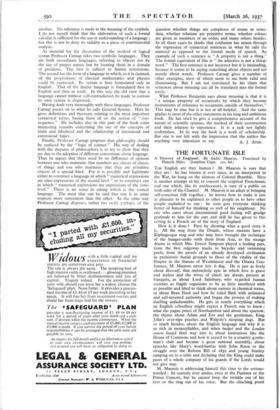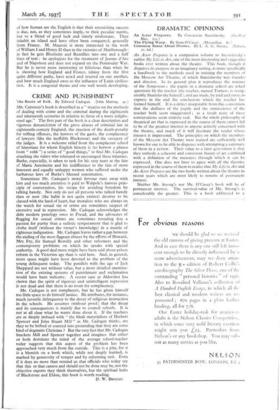THE FORTUNATE ISLE
THE English are they human ? M. Maurois is sure that they are : he has known it ever since, as an interpreter in the War, he hung on the silences of Colonel Bramble. Here is another attempt of his to convert the sceptical Frenchman, and one which, like its predecessors, is sure of a public on both sides of the Channel. M. Maurois is an adept at bringing self-conscious folk together ; he knows how to make it just as pleasant to be explained to other people as to have other people explained to one : he soon gets everyone thinking better of himself for thinking so well of his neighbour. No one who cares about international good feeling will grudge gratitude to him for the care and skill he has given to this setting to a French air of the story of England.
How is it done ? First by showing what a good story it is. All the way from the Druids, whose maxims have a Kiplingesque ring and who may have brought the technique of the hunger-strike with them from Asia, to the strange drama in which Mrs. Ernest Simpson played a leading part, from the first ridgeway tracks to bicycles and swimming pools, from the proofs of an already developed civilisation in prehistoric burial grounds to those of the vitality of the Empire in the Statute of Westminster and the Ottawa Con- ference, M. Maurois never lets it flag. He is just as lively about Beowulf, that melancholy epic in which love is grave and joyless and the wives of chiefs are always present at banquets, as about Lord Salisbury, who regarded human societies as fragile organisms to be as little interfered with as possible and liked to think about nations in chemical terms, or about Beau Nash and how he ruled Bath with unlimited and self-invested authority and began the process of making duelling unfashionable. He gets in nearly everything which an English schoolboy might expect a French one to know : what the pagan priest of Northumbria said about the sparrow, the rhyme about Adam and Eve and the gentleman, King John's over-ripe peaches and Walpole's sleeping dogs. But so much besides, about the English language and why it is so rich in monosyllables, and when budget and the London season found their way into it, about institutions like the House of Commons and how it ceased to be a country gentle- man's club and became a great national assembly, about episodes like Mary's word-battles with John Knox or the struggle over the Reform Bill of 5832 and young Stanley jumping on to a table and declaring that the King could make peers of a whole company of his guards if the Lords would not give way.
M. Maurois is addressing himself this time to the serious- minded : he scarcely ever smiles, even at the Puritans or the Prince Consort, but he cannot keep the twinkle out of his eyes or the ring out of his voice. But the clinching proof
of how human are the English is that their astonishing success is due, not, as they sometimes imply, to their peculiar merits, but to a blend of good luck and timely. misfortune. They inhabit an island and have often been conquered, generally from France. M. Maurois is more interested in the work of William I and Henry II than in the victories of Marlborough : in fact he gets Blenheim and Ramillies into one and a half lines of text : he apologises for the treatment of Jeanne d'Arc and of Napoleon and does not expand on the Peninsular War. But he is never more interesting or felicitous than when he is showing how England and France, taking from the first quite different paths, have acted and reacted on one another, and how much England owes to the influence of Latin civilisa- tion. It is a congenial theme and one well worth developing.











































 Previous page
Previous page